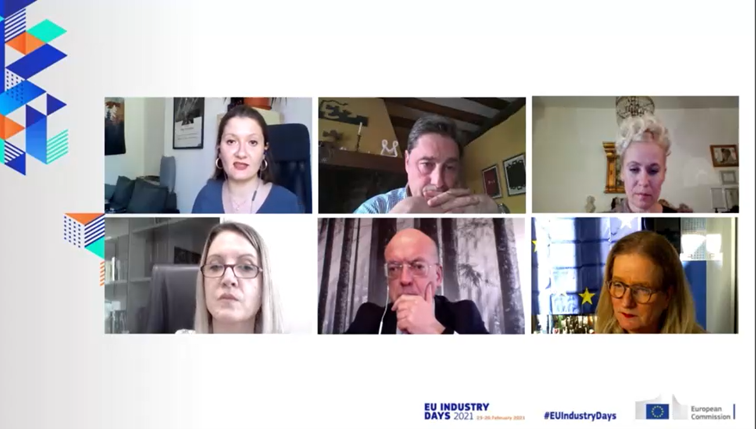
The constant changes in the world of work are even more accelerated through the digital transition, and workers need to develop the skills to navigate new forms of production and organization. Industrial cooperatives play an important role to maintain the industrial capacity in the EU. Over 8000 cooperatives are existing in Europe in the industry and construction sector, ranging from small enterprises to large industrial conglomerates. With the panel ‘Accelerating industrial transformation and worker’s skills development through worker cooperatives’ organized by Mondragon, Europe’s cooperative movement was visible at the EU Industry Days, the EU’s flagship even on industry in Europe.
The importance of a local industrial base has been shown when global supply chains have been disrupted during the first wave of the COVID-19 pandemic, when cooperatives quickly changed their operations to assist with the production of medical goods, sanitation products and other items in demand locally.
Moderated by CECOP Advocacy Coordinator Mila Shamku, the session started with an intervention by Prof Anu Puusa, Professor at the University of Eastern Finland and Board Member of Cooperatives Europe. She gave an overview of the history of the cooperative movement in creating innovative and human-centred businesses where members of the cooperative could meet their needs and aspirations. She highlighted the emancipative role of cooperatives for women, the social inclusion that many cooperatives provide and how cooperatives in Finland reacted to fight new challenges for workers in the digital economy, such as precarious working condition and isolation.
To remain competitive enterprises, cooperatives go great length to invest in the skills of their workers. During the panel, CECOP President Giuseppe Guerini stated workers are the most important asset of any worker cooperative, making investment in reskilling and upskilling an integral part of the business model. Furthermore, Mr Guerini reiterated that education is one of the seven principles that form the cooperative identity. During his intervention, he also highlighted that the digital transition led to the emerge of new cooperative responses that go beyond technical training:
‘Technological innovation in cooperatives needs to be accompanied by social innovation. It therefore is no surprise that new business models that seek to ensure a human-centred digital transition such as platform cooperatives emerged’
Giuseppe Guerini, CECOP President
Iñigo Albizuri Landazabal, Head of Global Public Affairs at Mondragon and President of CICOPA, introduced in the skill development efforts undertaken by Mondragon. Pointing out the roots of Mondragon as a school for vocational training, education remains a key building block for Mondragon. As most of the workers are owners of the cooperative, this education is not limited to technical skills: every worker also receives training in managerial skills, so that they can take their responsibilities as workers and owners of the cooperative.
Furthermore, he introduced the Mondragon University, which provides quality higher education and is accessible for workers and students that want to learn in the cooperative spirit of Mondragon.
Francesca Montalti, Head of Industrial Sector at Legacoop Produzione et Servizi and Member of the European Commission’s Industrial Forum gave testimony of the efforts of cooperatives to build responsible and sustainable enterprises. The dual digital and green transition and the current pandemic are challenges, but also provide opportunities for cooperative businesses to grow. To allow workers to navigate the digital transition, Legacoop Produzione et Servizi organized Industry 4.0 Academies across Italy, launched a cooperative Digital Innovation Hub and other tools for technology transfer.
The fourth speaker of the panel was Ulla Engelmann, Head of Unit Advanced Technologies, Clusters and Social Economy at the European Commission. During her intervention, she acknowledged the role of cooperatives in bridging both the environmental and digital transition. Through the promotion of human-centred values, cooperatives are guided by principles of social justice. Therefore, they are not only needed to react to transitions, but also to the ever-increasing inequalities in European societies. Ms Engelmann concluded by highlighting the steps the European Commission has taken with the launch of the Pact for Skills in November 2020.
Watch the video recording here.







 Employment & Social Inclusion
Employment & Social Inclusion 

